Эффективное управление ресурсами является высшим приоритетом для организаций, стремящихся максимизировать эффективность, снизить затраты и оптимизировать использование своих активов. Будь то человеческие ресурсы, бюджеты или время, правильное управление обеспечивает распределение каждого ресурса туда, где он нужен больше всего, что приводит к лучшим результатам проектов и более упорядоченным операциям.
Что такое программное обеспечение для управления ресурсами?
Программное обеспечение для планирования ресурсов является специализированным инструментом, предназначенным для помощи организациям в эффективном управлении своими ресурсами — будь то люди, бюджеты или время. Эти платформы предоставляют централизованную систему, где менеджеры могут назначать ресурсы для различных проектов, отслеживать, как они используются, и следить за тем, чтобы все использовалось эффективно. Программное обеспечение часто включает такие функции, как инструменты планирования, диаграммы Ганта и отслеживание в реальном времени, которые дают менеджерам видимость, необходимую для избежания узких мест и перегрузки ресурсов.
С помощью программного обеспечения для управления проектами и планирования ресурсов компании могут упорядочить свои операции и гарантировать, что необходимые ресурсы доступны для выполнения правильных задач в нужное время. Результатом является высокая продуктивность и контроль над бюджетами и графиками. Интеграция с другими бизнес-инструментами увеличивает ценность программного обеспечения, поскольку она предоставляет целостное представление о воздействии ресурсов на всю организацию.
Преимущества программного обеспечения для управления ресурсами
Программное обеспечение для управления ресурсами предлагает широкий спектр преимуществ. Прежде всего, оно обеспечивает оптимизированное распределение ресурсов, гарантируя, что ресурсы используются именно там, где они наиболее нужны, тем самым предотвращая недоиспользование или перегрузку членов команды. Это приводит к более сбалансированным рабочим нагрузкам и большей удовлетворенности сотрудников.
Еще одно значительное преимущество — это снижение накладных расходов. Имея ясный обзор использования ресурсов, компании могут избежать ненужных расходов и лучше управлять своими бюджетами. Это особенно ценно для бизнеса, который работает с ограниченными маржами или в конкурентных отраслях, где контроль затрат является ключевым фактором успеха.
Улучшенная прозрачность операций — еще одно преимущество программного обеспечения для управления проектами. Менеджеры могут легко отслеживать ход выполнения различных задач и проектов, предоставляя им данные в реальном времени о использовании ресурсов. Эта прозрачность помогает принимать обоснованные решения, корректировать стратегии по мере необходимости и улучшать общие результаты проекта. Кроме того, функции отчетности программного обеспечения позволяют проводить детальный анализ.
Наконец, улучшенные результаты проектов являются прямым следствием использования программного обеспечения для планирования ресурсов. С лучшим планированием, распределением ресурсов и отслеживанием проекты с большей вероятностью будут завершены вовремя и в рамках бюджета. Это не только повышает удовлетворенность клиентов, но и укрепляет репутацию компании, что приводит к большему количеству бизнес-возможностей и росту.
Как выбрать подходящее программное обеспечение для управления ресурсами
Выбор правильного программного обеспечения для планирования ресурсов для вашего бизнеса требует тщательного учета нескольких ключевых факторов. Масштабируемость имеет решающее значение, так как программное обеспечение должно расти вместе с вашим бизнесом, accomodating больше пользователей, проектов и ресурсов по мере необходимости. Это гарантирует, что инструмент останется эффективным, даже когда ваша организация расширяется.
Возможности отслеживания в реальном времени также важны. Программное обеспечение должно предоставлять актуальную информацию о распределении и использовании ресурсов, позволяя менеджерам принимать своевременные решения и корректировки. Это особенно важно в динамичных условиях, где требования к проектам могут быстро меняться, и для поддержания контроля необходимы быстрые реакции.
Интеграция с другими бизнес-инструментами — еще один значительный фактор, который нужно учитывать. Выбор программного обеспечения для управления проектами и планирования ресурсов должен легко соединяться с существующими системами, такими как инструменты управления проектами, CRM и бухгалтерские системы. Эта интеграция обеспечивает более последовательный рабочий процесс, сокращая необходимость в ручном вводе данных.
Наконец, удобство использования является критическим соображением. Программное обеспечение должно иметь интуитивно понятный интерфейс, который легко использовать всем членам команды, вне зависимости от их технической подготовки. Это минимизирует кривую обучения и обеспечивает быструю адаптацию инструмента в организации.
Методология
Для составления нашего списка лучших программных средств управления ресурсами на 2026 год мы провели строгий процесс оценки на основе нескольких ключевых критериев. Отзывы пользователей стали основным источником информации, поскольку они предоставляют ценную информацию о реальных результатах и надежности каждого инструмента. Мы проанализировали отзывы с различных платформ, чтобы оценить общий уровень удовлетворенности и выявить общие проблемы, с которыми могут столкнуться пользователи.
Мы также учитывали репутацию в отрасли каждого программного обеспечения. Мы также изучили богатство функционала каждого программного обеспечения, оценив широту и глубину предлагаемых функций, таких как распределение ресурсов, отслеживание времени, возможности облачного хранения и интеграции.
Экономическая эффективность оказалась еще одним важным фактором в нашей оценке. Мы сравнили ценообразовательные модели каждого инструмента, учитывая не только начальную стоимость, но и ценность, обеспечиваемую с точки зрения функций и поддержки. Программное обеспечение, которое предлагает надежные возможности по разумной цене, было предпочтительным.
Кроме того, мы оценили масштабируемость каждого инструмента, гарантируя, что он может расти вместе с бизнесом и справляться с растущими требованиями, по мере расширения компании. Наконец, мы оценили качество поддержки клиентов, предоставляемой каждым поставщиком, включая доступность ресурсов, таких как учебные пособия, вебинары и отзывчивые службы поддержки. Эта комплексная оценка гарантирует, что перечисленные здесь инструменты представляют собой лучшие варианты для управления ресурсами в 2026 году, способные удовлетворить разнообразные потребности бизнеса в различных отраслях.
Лучшее программное обеспечение для управления ресурсами на 2026 год
Мы подготовили короткую таблицу, чтобы вы могли сравнить наиболее важные преимущества каждой из систем в нашем списке:
| Название программного обеспечения | Ключевые функции | Лучше всего подходит для | Цена на пользователя/месяц |
| Worksection | Управление задачами, отслеживание времени, диаграмма Ганта, Канбан, отчетность, календарь, контроль доступа. | Малые и средние компании | от $3.4 за пользователя/месяц |
| Mavenlink | Планирование ресурсов, учет проектов, командное взаимодействие | Фирмы профессиональных услуг и консалтинга | Цена по запросу |
| Smartsheet | Интерфейс на основе сетки, отслеживание ресурсов, сотрудничество в реальном времени | Команды, работающие над проектами, требующие подробного отслеживания | от $9 за пользователя/месяц |
| Float | Планирование ресурсов, расписание, прогнозирование | Команды, нуждающиеся в продвинутом распределении ресурсов | от $6 за пользователя/месяц |
| Wrike | Управление ресурсами, диаграмма Ганта, отслеживание времени | Команды, управляющие сложными проектами с несколькими заинтересованными сторонами | от $9.80 за пользователя/месяц |
| Resource Guru | Планирование ресурсов, командный календарь, отслеживание времени | Малые команды и агентства, сосредотачивающиеся на распределении ресурсов | от $4.16 за пользователя/месяц |
| ClickUp | Настраиваемые представления, управление задачами, автоматизация | Команды, нуждающиеся в гибком и мощном инструменте управления | от $7 за пользователя/месяц |
| Asana | Управление задачами, сроки проектов, команда сотрудничества | Маркетинговые и креативные команды | от $10.99 за пользователя/месяц |
| Monday.com | Настраиваемые рабочие процессы, отслеживание времени, интеграции | Растущие компании, нуждающиеся в масштабируемости | от $9 за пользователя/месяц |
| Hub Planner | Планирование ресурсов, управление мощностями, отслеживание проектов | Агентства и предприятия, управляющие глобальными командами | от $7 за пользователя/месяц |
Worksection
Worksection — это онлайн-программное обеспечение для управления проектами и планирования ресурсов, основанное в 2008 году, разработанное для упрощения сложных проектов с помощью мощных функций управления ресурсами. Оно включает в себя отслеживание времени, диаграмму Ганта и эффективные инструменты распределения ресурсов, что делает его идеальным для малых и средних компаний. Интуитивно понятный интерфейс Worksection обеспечивает простоту использования, даже для членов команды, незнакомых с инструментами управления проектами. Кроме того, сервис поддерживает централизованную связь, обеспечивая бесшовное сотрудничество между членами команды.
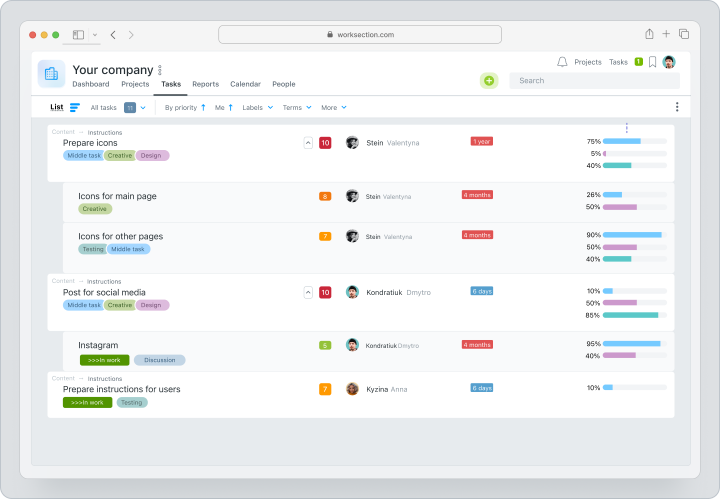
Работает более 1500 компаний, включая маркетинговые агентства, дизайнерские студии и юридические фирмы, Worksection — это экономически выгодное решение для оптимизации управления ресурсами. Цены начинаются от всего $3.4 за пользователя в месяц.
Mavenlink
Mavenlink — это универсальный инструмент управления ресурсами, предназначенный для профессиональных услуг и консалтинговых фирм. Он предлагает расширенные функции планирования ресурсов, проектного учета и командного взаимодействия, позволяя компаниям эффективно управлять своими ресурсами по множеству проектов. Подробная аналитика Mavenlink предоставляет информацию о использовании ресурсов, помогая фирмам оптимизировать свою рабочую силу и повышать прибыльность. Возможности интеграции платформы обеспечивают бесшовное подключение к существующим бизнес-инструментам, повышая общую продуктивность.
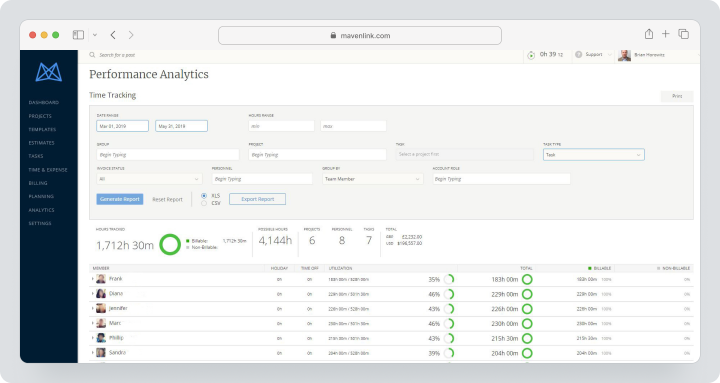
Цены доступны по запросу, отражая его премиальные функции, адаптированные к специфическим потребностям отрасли.
Smartsheet
Smartsheet — это универсальное программное обеспечение для управления ресурсами, которое сочетает простоту электронной таблицы с мощными функциями управления проектами. Оно идеально подходит для команд, работающих над проектами, которые требуют подробного отслеживания и сотрудничества в реальном времени. Smartsheet предлагает функции отслеживания ресурсов, диаграммы Ганта и автоматизации, которые помогают командам управлять сложными проектами с легкостью. Гридовый интерфейс платформы позволяет легко организовать данные, что делает их доступными для пользователей с разными уровнями квалификации.
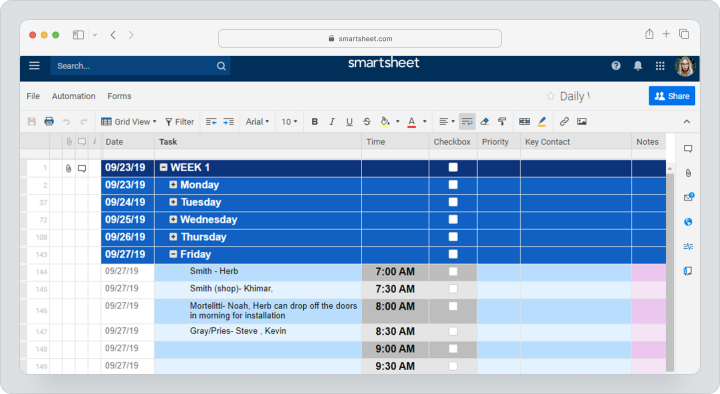
Интеграция Smartsheet с другими инструментами, такими как Microsoft Office и Salesforce, обеспечивает синхронизацию всех данных проекта, предоставляя полное представление об использовании ресурсов. Цены начинаются от $9 за пользователя в месяц.
Float
Float — это специализированный инструмент для планирования ресурсов, предназначенный для команд, которым необходимы расширенные возможности распределения ресурсов. Он предлагает такие функции, как планирование ресурсов, прогнозирование и отслеживание в реальном времени, позволяя менеджерам эффективно распределять ресурсы по проектам. Интуитивно понятный интерфейс Float и функция перетаскивания делают легким корректировку расписания и управление нагрузками. Инструменты прогнозирования платформы помогают предсказать будущие потребности в ресурсах, позволяя компаниям заранее планировать и избегать потенциальных узких мест.
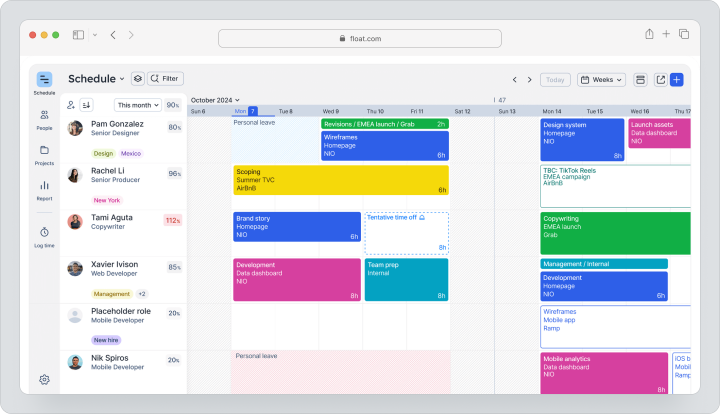
Стартовая цена составляет $6 за пользователя в месяц, что делает Float доступным вариантом для команд, стремящихся улучшить практику управления ресурсами.
Wrike
Wrike — это мощное программное обеспечение для управления проектами с акцентом на планирование ресурсов. Оно включает в себя такие функции, как диаграммы Ганта, отслеживание времени и распределение ресурсов, что делает его идеальным для команд, управляющих сложными проектами с несколькими заинтересованными сторонами. Настраиваемые шаблоны Wrike и подробные инструменты отчетности предоставляют глубокую информацию о использовании ресурсов, помогая командам оптимизировать свои операции. Интеграция платформы с такими инструментами, как Google Drive и Salesforce, гарантирует, что все данные проекта будут централизованы, что облегчает сотрудничество и принятие решений.
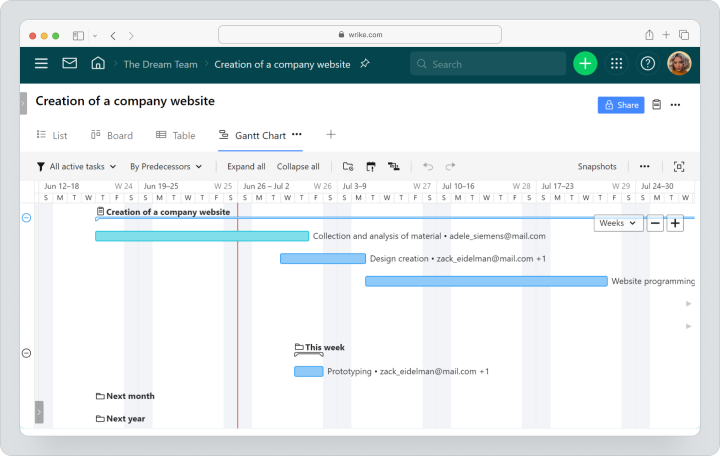
Цены для Wrike начинаются от $9.80 за пользователя в месяц, что предлагает отличное соотношение цены и качества для бизнеса, стремящимся улучшить управление ресурсами.
Resource Guru
Resource Guru — это инструмент для планирования ресурсов, разработанный для небольших команд и агентств, которым необходимо эффективно управлять своими ресурсами. Он предлагает такие функции, как командные календари, отслеживание времени и распределение ресурсов, позволяя менеджерам легко планировать ресурсы по проектам. Простой интерфейс Resource Guru облегчает пользователям понимание, кто доступен и распределение ресурсов соответственно. Функции отчетности платформы предоставляют информацию о использовании ресурсов, помогая командам избежать перенагрузки и гарантировать, что проекты выполняются вовремя.
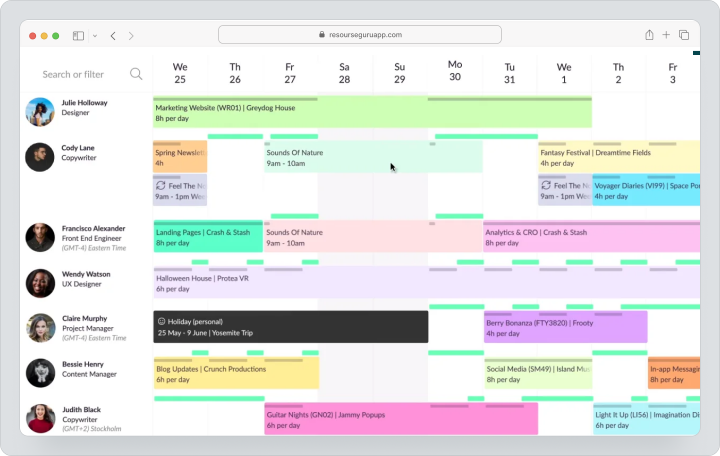
Цены начинаются от $4.16 за пользователя в месяц, что делает его доступным вариантом для малых бизнесов.
ClickUp
ClickUp — это altamente настраиваемый инструмент для управления ресурсами, который предлагает широкий спектр функций, включая управление задачами, автоматизацию и распределение ресурсов. Он идеально подходит для команд, которым необходим гибкий и мощный инструмент для управления своими ресурсами и проектами. Настраиваемые представления ClickUp позволяют командам управлять задачами в различных форматах, таких как списки, доски или календари, в зависимости от их предпочтений. Возможности интеграции платформы обеспечивают централизованность всех данных проекта, предоставляя полное представление об использовании ресурсов.
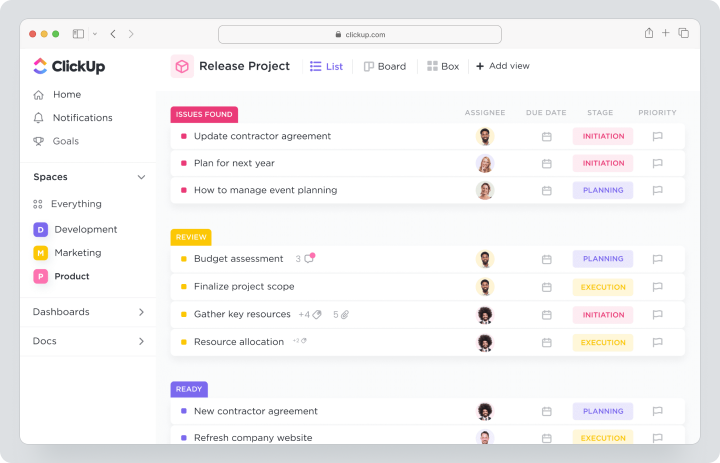
Цены начинаются от $7 за пользователя в месяц, что делает ClickUp экономически эффективным решением для команд любого размера.
Asana
Asana — это универсальное программное обеспечение для управления проектами, которое отлично справляется с управлением ресурсами, особенно для маркетинговых и креативных команд. Оно предлагает функции, такие как управление задачами, сроки проектов и командное сотрудничество, позволяя командам эффективно управлять ресурсами по множеству проектов. Удобный интерфейс Asana и интеграция с другими инструментами, такими как Google Drive и Slack, упрощают отслеживание использования ресурсов и гарантируют, что проекты движутся в графике.
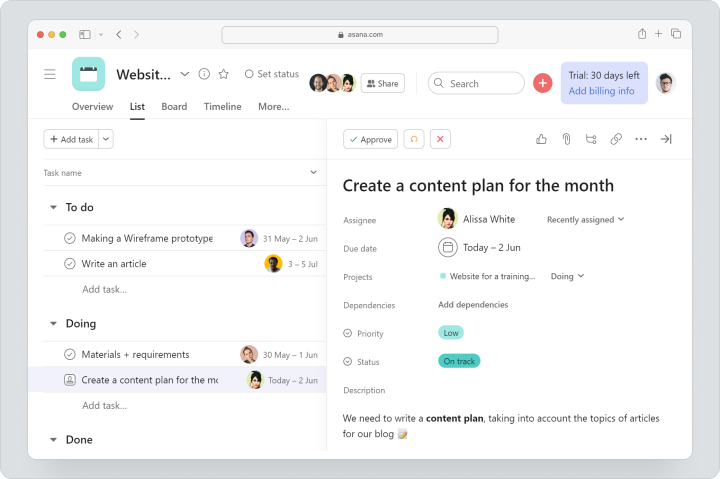
Цены начинаются от $10.99 за пользователя в месяц, что делает Asana мощным вариантом для команд, стремящихся улучшить управление проектом.
Monday.com
Monday.com — это гибкое программное обеспечение для управления проектами, которое включает в себя мощные функции управления ресурсами. Оно предлагает настраиваемые рабочие процессы, отслеживание времени и интеграцию с различными инструментами, что делает его подходящим для растущих компаний, которые нуждаются в масштабируемом решении. Визуальный интерфейс Monday.com позволяет командам видеть распределение ресурсов на одном взгляде, что помогает принимать обоснованные решения и корректировать нагрузки по мере необходимости. Масштабируемость платформы гарантирует, что она может расти вместе с вашим бизнесом, предоставляя непрерывную ценность по мере изменения требований к управлению проектами.
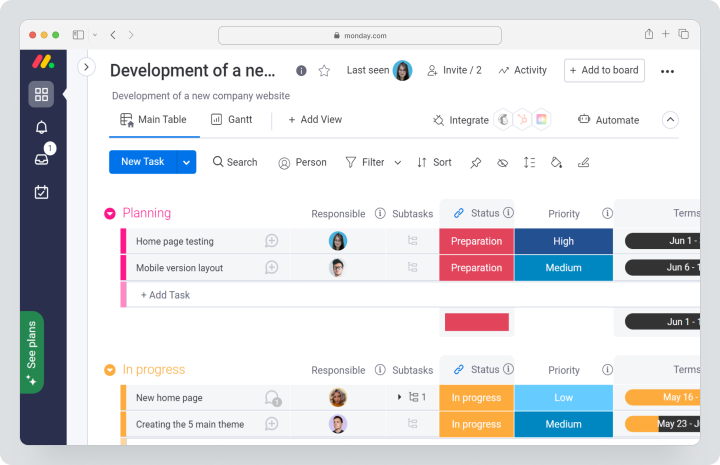
Цены начинаются от $8 за пользователя в месяц. Monday.com — это хороший инструмент для управления ресурсами по разумной цене.
Hub Planner
Hub Planner — это комплексное программное обеспечение для управления проектами, предназначенное для агентств и предприятий, управляющих глобальными командами. Оно предлагает функции, такие как планирование ресурсов, управление емкостью и отслеживание проектов, что позволяет менеджерам эффективно распределять ресурсы по нескольким локациям. Аналитика в реальном времени Hub Planner предоставляет информацию о использовании ресурсов, помогая командам оптимизировать свои операции и избежать потенциальных узких мест. Интеграция платформы с другими инструментами гарантирует, что все данные проекта синхронизированы, предоставляя четкое представление об использовании ресурсов по всей организации.
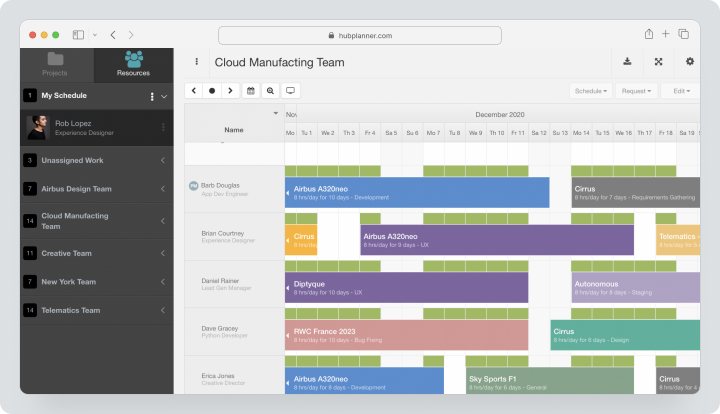
Цены начинаются от $7 за пользователя в месяц, что делает Hub Planner экономически эффективным решением для больших команд с комплексными потребностями в управлении ресурсами.
Кому следует использовать программное обеспечение для управления ресурсами?
Программное обеспечение для управления ресурсами полезно для широкого диапазона отраслей и размеров бизнеса. Фирмы IT-услуг, например, могут использовать эти инструменты для эффективного управления своими человеческими ресурсами, гарантируя, что нужные люди выделяются для правильных проектов по их навыкам и доступности. Производственные компании также получают значительные выгоды, так как они могут использовать программное обеспечение для отслеживания запасов, планирования производства и более эффективного управления цепочкой поставок.
Консалтинговые фирмы являются еще одной важной категорией пользователей программного обеспечения для планирования ресурсов. Эти фирмы часто работают над несколькими проектами одновременно, требуя точного распределения ресурсов для соблюдения сроков клиентов и поддержания прибыльности. В креативной индустрии, такой как маркетинговые агентства и дизайнерские студии, программное обеспечение для управления проектами и планирования ресурсов помогает в управлении клиентскими проектами, распределении задач среди членов команды и отслеживании оплачиваемых часов. Эти инструменты особенно полезны для команд, работающих над цифровыми кампаниями и проектами в социальных медиа, так как они позволяют точно распределять ресурсы, обеспечивая правильную экспертизу для каждой задачи.
В целом, любая организация, которая имеет дело со сложными проектами и нуждается в эффективном управлении ресурсами, найдет программу для планирования ресурсов незаменимой для улучшения эффективности и достижения лучших результатов.
Кейс-стадии: Эффективное управление ресурсами в действии
В качестве примера успешного внедрения управления ресурсами большая ИТ-компания испытывала трудности с распределением ресурсов по нескольким проектам. Компания внедрила программное обеспечение для управления проектами, которое предоставило видимость в реальном времени по доступности и использованию ресурсов. Это позволило менеджерам более эффективно распределять ресурсы, избегать перенагрузки и гарантировать, что правильные навыки применяются к правильным проектам. В результате компания значительно улучшила время выполнения проектов и удовлетворенность клиентов, поскольку проекты были выполнены вовремя и в рамках бюджета.
В другой кейс-стадии глобальная производственная компания внедрила программное обеспечение для управления ресурсами, чтобы оптимизировать свои производственные процессы. До внедрения программного обеспечения компания сталкивалась с проблемами управления запасами и планирования производства, что приводило к частым задержкам и увеличению затрат. Используя программное обеспечение для управления проектами и планирования ресурсов, компания смогла отслеживать запасы в реальном времени, оптимизировать производственные графики и сократить время простоя. Это привело к увеличению эффективности производства на 15% и значительному сокращению операционных затрат, демонстрируя мощное воздействие эффективного управления ресурсами.
FAQ
Как программное обеспечение для управления ресурсами интегрируется с инструментами управления проектами?
Программное обеспечение для управления ресурсами обычно интегрируется с инструментами управления проектами через API, позволяя бесшовной передаче данных между двумя системами. Эта интеграция предоставляет единое представление о временных рамках проектов и распределении ресурсов, улучшая общее планирование и выполнение проектов.
Какие функции необходимы в программном обеспечении для управления ресурсами?
Критические функции включают в себя распределение ресурсов в реальном времени, планирование емкости, отслеживание времени и аналитику. Эти функции гарантируют, что ресурсы используются эффективно, потенциальные узкие места выявляются заранее, а проекты остаются на правильном пути.